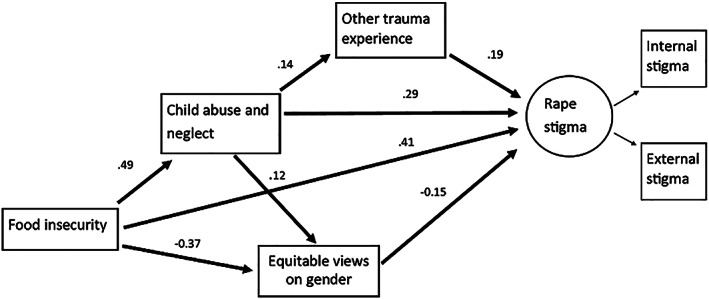In the above article, the uploaded version of the structural equation model figure (Figure 1) is incorrect and does not match its description in the text.
FIGURE 1.

Final structural model of paths to rape stigma
The corrected figure is provided below:
In page 334, there is also an error in Table 5 as the lower confidence interval and the effect size were transposed in the table for the Unstandardised and Standardised Coefficients. The corrected table is provided below:
TABLE 5.
Rape stigma SEM: Direct effects and equation level goodness of fit
| Unstandardized coef. (95% CI) | Standardized coef. (95%CI) | p value | |
|---|---|---|---|
| Paths | |||
| Childhood abuse and neglect → rape stigma | 0.29(0.19–0.38) | 0.27(0.19–0.35) | <0.001 |
| Food insecurity → rape stigma | 0.41(0.04–0.78) | 0.09(0.01–0.16) | 0.03 |
| Equitable gender attitudes → rape stigma | −0.15(−0.24 to −0.06) | −0.14(−0.21 to −0.06) | 0.001 |
| Other traumatic experiences→ rape stigma | 0.19(0.02–0.37) | 0.09(0.01–0.17) | 0.033 |
| Food insecurity → childhood abuse and neglect | 0.49(0.10–0.87) | 0.11(0.03–0.19) | 0.014 |
| Childhood abuse and neglect → other traumatic experiences | 0.14(0.10–0.18) | 0.29(0.22–0.37) | <0.001 |
| Childhood abuse and neglect → equitable gender attitudes | 0.12(0.05–0.18) | 0.12(0.05–0.20) | 0.001 |
| Food insecurity → equitable gender attitudes | −0.37(−0.65 to −0.09) | −0.09(−0.15 to −0.02) | 0.009 |
| Variances | |||
| Other traumatic experiences | 3.02(2.68–3.35) | 0.91(0.87–0.96) | <0.001 |
| Equitable gender attitudes | 12.65(11.38–13.92) | 0.98(0.96–1.00) | <0.001 |
| Childhood abuse and neglect | 14.62(10.97–18.27) | 0.99(0.97–1.01) | <0.001 |
| Internal rape stigma | 10.09(5.26–14.92) | 0.38(0.20–0.56) | <0.001 |
| External rape stigma | 4.72(3.75–5.68) | 0.61(0.48–0.73) | <0.001 |
| Rape stigma | 14.45(9.67–19.23) | 0.88(0.83–0.93) | <0.001 |
| Equation level goodness of fit | R 2 | ||
| Other traumatic experiences | 0.086 | ||
| Equitable gender attitudes | 0.021 | ||
| Childhood abuse and neglect | 0.012 | ||
| Internal rape stigma | 0.619 | ||
| External rape stigma | 0.393 | ||
| Rape stigma | 0.118 | ||
Lastly in page 335, Results section, there is an error in the second to last sentence and it should read as follows:
There was also a pathway from food insecurity to rape stigma mediated by childhood trauma and exposure to other trauma, with the direction of effect indicating that greater trauma exposure was associated with more rape stigma.
The authors apologize for these errors.
REFERENCE
- Jewkes, R. , Mhlongo, S. , Chirwa, E. , Seedat, S. , Myers, B. , Peer, N. , Garcia‐Moreno, C. , Dunkle, K. , & Abrahams, N. (2022). Pathways to and factors associated with rape stigma experienced by rape survivors in South Africa: Analysis of baseline data from a rape cohort. Clinical Psychology & Psychotherapy, 29(1), 328–338. 10.1002/cpp.2637 [DOI] [PMC free article] [PubMed] [Google Scholar]


